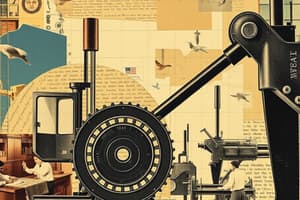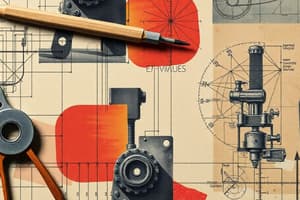Podcast
Questions and Answers
What is the purpose of a title block in a mechanical drawing?
What is the purpose of a title block in a mechanical drawing?
- To provide a 3D representation of the object
- To include the drawing's title, revision number, and revision date (correct)
- To display the front, top, and side views of the object
- To show the internal structure of an object
In a mechanical drawing, which view provides a 3D representation of the object from all angles?
In a mechanical drawing, which view provides a 3D representation of the object from all angles?
- Section Views
- Main Orthographic Views
- Pictorial Isometric View (correct)
- Title Block
What is the main purpose of section views in a technical drawing?
What is the main purpose of section views in a technical drawing?
- To provide a 3D representation of the object
- To display the front, top, and side views of the object
- To show the internal structure of an object (correct)
- To include detailed notes for the manufacturer
Why is a Pictorial Isometric View used in technical drawing?
Why is a Pictorial Isometric View used in technical drawing?
Which component of a technical drawing includes information like the revision number and date?
Which component of a technical drawing includes information like the revision number and date?
What do main orthographic views in a technical drawing typically include?
What do main orthographic views in a technical drawing typically include?
What is the purpose of Detail Views in mechanical drawings?
What is the purpose of Detail Views in mechanical drawings?
How does the GD&T system contribute to mechanical drawings?
How does the GD&T system contribute to mechanical drawings?
What equipment is essential for mechanical drafting?
What equipment is essential for mechanical drafting?
Why are industry standards important in mechanical drafting?
Why are industry standards important in mechanical drafting?
What is the purpose of 'Notes to the Manufacturer' in a mechanical drawing?
What is the purpose of 'Notes to the Manufacturer' in a mechanical drawing?
What do educational resources like courses offer in mechanical drafting?
What do educational resources like courses offer in mechanical drafting?
Study Notes
Mechanical Drafting: Technical Drawing
Mechanical drafting, also known as mechanical drawing, is a process used to create technical drawings and designs. It can be done by hand or with computer-aided drafting (CAD) software. These drawings serve as detailed working diagrams that form the basis for manufacturing components, devices, tools, and machinery. In this article, we'll discuss the process of preparing a mechanical drawing, focusing on the subtopic of technical drawing.
Preparing a Mechanical Drawing: A Step-by-Step Guide
A mechanical drawing should include several components to be clear for the CNC machinist. These components include a title block, a pictorial isometric view, main orthographic views, section views, detail views, and notes to the manufacturer. Here are the steps to best prepare a technical drawing:
-
Title Block: The title block is a standard part of a mechanical drawing. It includes the drawing's title, revision number, and the date of the latest revision.
-
Pictorial Isometric View: This view provides a 3D representation of the object from all angles. It's often used for complex parts where the traditional orthographic views are not sufficient.
-
Main Orthographic Views: These are the front, top, and side views of the object. They provide a detailed view of the object from different perspectives.
-
Section Views: These views are used to show the internal structure of an object. They are particularly useful for understanding how a part is manufactured or assembled.
-
Detail Views: These views provide a closer look at specific areas of the object. They are used to highlight important features or dimensions that need special attention.
-
Notes to the Manufacturer: These are instructions for the manufacturer on how to produce the part. They include information such as materials, tolerances, and any special requirements.
Adding Dimension, Tolerances, and Annotations
To add dimensions to your mechanical drawing, it's important to follow certain tips. These include ensuring that all dimensions are accurate and that they are placed where they are needed. The GD&T system is used to specify tolerances on a mechanical drawing. This system helps ensure that parts fit together correctly and that they meet the required specifications.
Tools and Equipment for Mechanical Drafting
Mechanical drafting requires a range of tools and equipment. These include blueprint measuring tools, compasses, irregular curves, drafting dividers, drafting paper, drawing boards, protractors, reference and light tables, scales, stencils, stools, tape, triangles, T-squares, and drawing tubes. Many of these tools are available at Engineer Supply.com.
Educational Resources for Mechanical Drafting
If you're interested in learning more about mechanical drafting, consider taking a course. The Tool and Die Guy offers a course on mechanical drafting that covers various topics, including the tools needed for drafting and the principles of freehand drawing. ITI Technical College also offers an Associate of Occupational Studies (AOS) Degree in Drafting and Design Technology, which provides the training you need for a career in mechanical drafting and design.
Industry Standards for Mechanical Drafting
Industry standards play a crucial role in mechanical drafting. These standards ensure that technical drawings are clear, concise, and easy to understand. They include using a conventional drafting language for all professionals' understanding of drawings and for anyone who acquires parts or equipment needed for projects. Upheld standards improve the quality of components, tools, and machinery, helping companies stay competitive.
Studying That Suits You
Use AI to generate personalized quizzes and flashcards to suit your learning preferences.
Description
Test your knowledge of technical drawing in mechanical drafting with this quiz. Explore topics such as creating detailed working diagrams, preparing title blocks, orthographic views, section views, and adding dimensions and annotations. Learn about the tools and equipment used in mechanical drafting and understand industry standards for clear and concise technical drawings.




